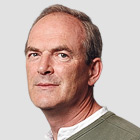Diplomats say Dmitry Medvedev, Russia's neophyte president, is gradually emerging from the dark shadow cast by his predecessor and current prime minister, Vladimir Putin, and becoming his own man. His international reputation was reinforced at this month's Moscow summit when Barack Obama described him as a "professional" and promised a new start in bilateral relations. "President Medvedev and I are committed to leaving behind the suspicion and rivalry of the past," Obama said, the presidential charm machine set to rapid fire.
Medvedev's domestic stock is rising, too. His poll ratings soared last autumn after Russia's war with Georgia and his condemnation of Stalin's labour camp gulag as a "tragic page in our country's history" – and have remained consistently high despite the economic downturn. The 43-year-old's reputation as a next-generation reform technocrat was underscored this week when he unveiled plans to open up regional and national politics to younger Russians, especially under-30s who comprise more than 25% of the population.
Medvedev, formerly Putin's campaign manager, had not held public office before his election last year – and would likely have remained an obscure apparatchik but for Putin's endorsement. But speculation, rife 12 months ago, that the new man was merely keeping the presidential podium warm pending an inevitable Putin return in 2012, is subsiding. Kremlin insiders now suggest Medvedev is in the process of acquiring sufficient political clout to chart an independent future.
All well and good for the boyhood fan of Deep Purple and Black Sabbath – but increased exposure brings increased expectations, and a host of problems lie between Medvedev and a second presidential gig. One of the most pressing, enforcement of the rule of law, was highlighted last week after the slaying in Grozny of Natalia Estemirova, a courageous human rights critic of Chechnya's warlord president, Ramzan Kadyrov.
Unlike Putin, Medvedev was quick to condemn the murder, as was the case earlier this year after Chechnya human rights lawyer Stanislav Markelov and Novaya Gazeta journalist Anastasia Baburova were gunned down in Moscow. But he was equally quick to absolve Kadyrov of blame. And critics say he again failed to set in train a process that might catch those who ordered and carried out these and other murders, including that of investigative journalist Anna Politkovskaya.
"Medvedev has expressed his outrage at Natasha's [Natalia's] death but that is not enough," said Tanya Lokshina of Human Rights Watch in Russia, writing in the Washington Post. "The Russian government must launch an immediate and thorough investigation into not only Natasha's death but the full range of human rights atrocities that have unfolded under (Kadyrov's) leadership."
More broadly, the Estemirova killing refocused attention on Russia's unruly northern Caucasus region. Unstable and dangerous though Chechnya is, neighbouring Ingushetia was even worse in 2008 in terms of insurgency-related violence, and Dagestan was not far behind. The context is the feared spread of Islamist militancy from central Asia – a potent challenge to Medvedev's authority as with previous Russian leaders back to the time of the tsars.
US vice-president Joe Biden's visits to Ukraine and Georgia this week provide an uncomfortable reminder for Medvedev, meanwhile, that Obama's feelgood politics, so persuasive up close, conceal sharp edges and red lines. The US leader wanted nuclear arms cuts and help with Afghanistan – and got both. But he has not jettisoned the Bush administration's commitment to Nato membership for the two former Soviet republics and is likewise pursuing planned missile defence batteries on Russia's western borders. He continues to urge reduced European dependency on Russian oil and gas, the Kremlin's economic lifeblood.
"Our efforts to reset relations with Russia will not come at the expense of other countries," said Tony Blinken, a Biden adviser. Like the EU, the US viewed Medvedev's visit to South Ossetia last week as an affront to Georgian sovereignty. Washington rejected as old hat Russian ideas about "spheres of influence", other American officials said. And that principle applied not only to Georgia and Ukraine but also to resource-rich or strategically placed countries such as Uzbekistan, Turkmenistan and Kyrgyzstan, where the US has recently renewed its lease on an air base.
Russia still sees itself as a great power, a perception vigorously promoted by Putin. But the toughest challenge facing Medvedev may be to tailor and trim that inflated self-image to fit a less glamorous reality. Russian weakness, subtly exploited by Obama in Moscow, was the hidden story of the Putin years. In the Medvedev era, developing a law-abiding, economically diversified civil society at home while pursuing less un-civil, more co-operative behaviour abroad may be the path to returning strength and a second term.







